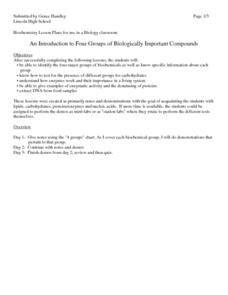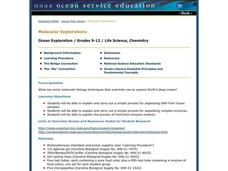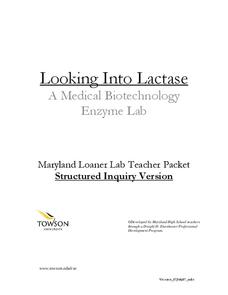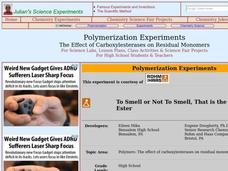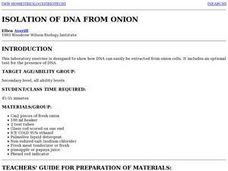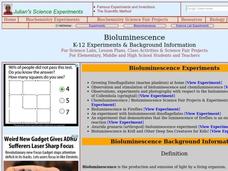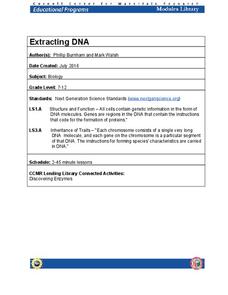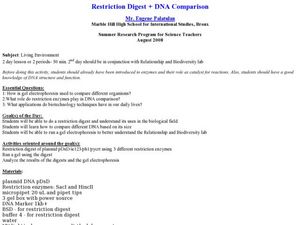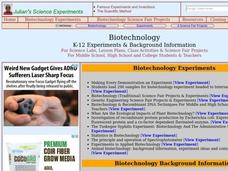Curated OER
An Introduction to Four Groups of Biologically Important Compounds
High schoolers learn about the four biochemicals that are important biologically. In this biochemicals lesson plan, students identify the four major groups of biochemicals including carbohydrates, proteins, lipids and nucleic acids. They...
Curated OER
Molecular Explorations
Students explain the processes for separating DNA from tissue and separating complex mixtures. In this exploratory lesson plan students complete a lab where they extract DNA.
Curated OER
DNA Detectives
In order to understand DNA fingerprinting, advanced biology aces divise a crime scenario and analyze three different samples of lambda DNA. This creative lesson plan provides practice with micropipettes, electrophoresis boxes, and other...
Curated OER
CELL TRANSFORMATION IN TOBACCO LEAF DISKS
Young scholars work with whole plant material and are not required to measure small quantities, yet they can see evidence of transformed plant cells (plant cells that have genes from bacterial plasmids). This is a laboratory suitable for...
Howard Hughes Medical Institute
Got Lactase? The Co-Evolution of Genes and Culture
Does the human body evolve as quickly as human culture? With a stellar 15-minute video, explore the trait of lactose intolerance. Only about 1/3 of human adults seem to still have the enzyme lactase and therefore, the ability to digest...
Curated OER
Enzymatic Action
Students observe how a cell uses an enzyme to rid itself of a poisonous substance by experimenting with hydrogen peroxide, potatoes, liver and carrots. They record the temperature and changes of the hydrogen peroxide as other elements...
Curated OER
Simulation of Gene Splicing
High schoolers use the exercise as a prelude to a "wet" lab or as a substitute for such a lab. It correlates well with colony transformation labs. This lab is recommended for students what have difficulty with the abstractions that...
Curated OER
Catalase and Catalysis
Students explore enzyme catalysis through a series of experiments. In this chemistry lesson, students determine the factors affecting catalysis. They explain the different uses of this process.
Towson University
Looking Into Lactase: Structured Inquiry
Why is lactase important? Biology scholars explore enzyme function in a structured inquiry lab. The activity tasks lab groups with observing how temperature and pH affect enzyme activity, as well as determining which milk products...
Curated OER
Demonstration of Cheese-Making Enzyme Magic
Learners watch a demo which is a modification of an enzyme lab which is done as a "magic show". It's primary purpose is to tickle the curiosity of the student and grab interest before discussion of enzymes. It is also used to stimulate...
Curated OER
Identification of Gram Negative Bacilli—Oxidase
In this biology worksheet, students identify the different types of reagents being used with the samples as part of an extensive lab experiment.
Curated OER
Alcoholic Fermentation in Yeast
Biology learners investigate the effect of sucrose concentration on yeast alcoholic fermentation. During the lesson,they compare and contrast the processes of cellular respiration and alcoholic fermentation. They design an experiment to...
Curated OER
Applied Evolution: How Will We Get There from Here?
Learners explore the basic process of natural selection and how people can manipulate that process today. The consequences of natural selection on daily life and the implications of evolutionary biology in basic and applied science is...
Curated OER
Polymerization Experiments
Students explain the process of polymerization. In this chemistry lesson, students produce carboxylesterase in the lab. They test its effectiveness in removing the by-product odor.
Curated OER
ISOLATION OF DNA FROM ONION
Students perform a laboratory exercise designed to show how DNA can easily be extracted from onion cells. They conduct an optional test for the presence of DNA using standard lab equipment.
Curated OER
Bioluminescence
Students differentiate chemiluminescence from bioluminescence. In this biology lesson, students explain how fireflies and other animals emit light. They discuss the applications of engineered bioluminescence.
Curated OER
Polymerase Chain Reaction (PCR)
Students explore how PCR works through various activities. In this biology instructional activity, students explain how PCR generate copies of DNA. They simulate the process using an online interactive website.
Cornell University
Extracting DNA
Uncover the basics of DNA structure through exploration activities. Collaborative groups build DNA models and recreate the process of replication. Then, using plant cells such as peas or strawberries, they extract a DNA sample.
Curated OER
Determination of Phylogenetic Relationships Using Restriction Analysis
Students applied various mathematical analyses to interpret their data. By using the resulting DNA fragment patterns from several enzymes students established a possible evolutionary relationship among the mice.
Curated OER
The Great Cafeteria Caper
Learners extract DNA from their own hair roots. They run an electrophoresis gel to examine patterns of their DNA along with standard DNA. The experiment is based on a crime scene scenario.
Towson University
Case of the Crown Jewels
Can your biology class crack the Case of the Crown Jewels? Junior forensics experts try their hands at DNA restriction analysis in an exciting lab activity. The lesson introduces the concept of restriction analysis, teaches pipetting and...
Curated OER
Dinosaur and DNA Days
Biology stars extract DNA samples from beef thymus and then examine its properties. They use enzymes to digest the DNA samples, and then use electrophoresis to separate fragments. Finally, they discuss methods and principles of...
Curated OER
Restriction Digest + DNA Comparison
High schoolers compare different DNA and run a gel electrophoresis. For this DNA lesson students complete a DNA activity that allows them to better understand its structure and function.
Curated OER
Biotechnology
Students explore biotechnology through various activities. For this biology lesson, students analyze its pros and cons. They study and read informative articles about biotechnology.


